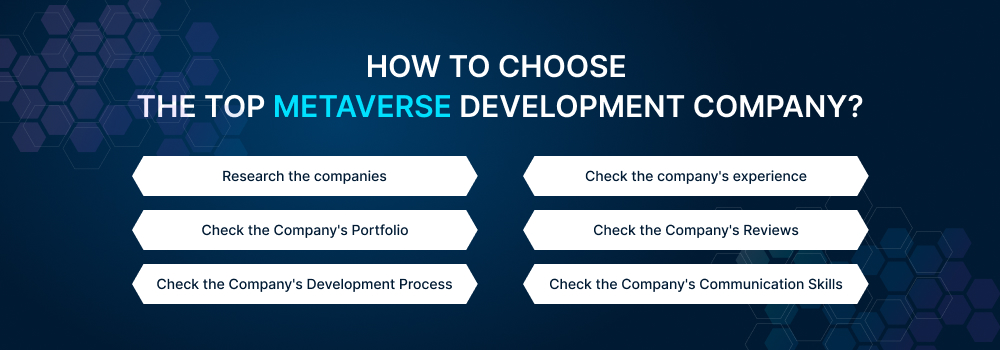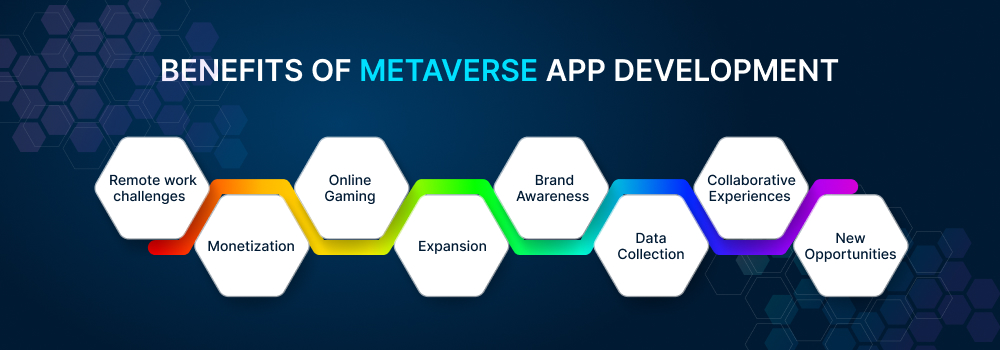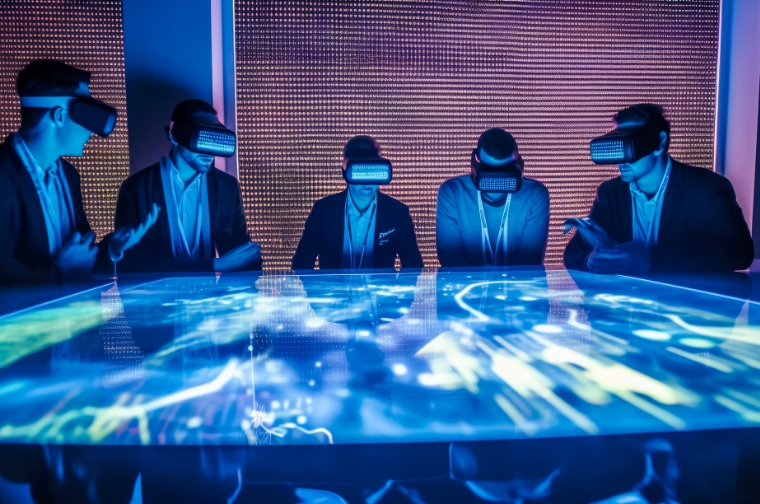Metaverses is the future of the internet, and businesses are realizing its potential. Developing a Metaverse requires expertise and knowledge of Metaverse concept rows, it’s imperative to select the right Metaverse Development Company to ensure your project’s success.
The term Metaverse was coined by science fiction author Neal Stephens in his 1992 book ‘Snow Crash’.
The choice of a metaverse development company is a critical decision that can significantly impact your venture’s success. In this article, we will outline the essential factors to consider when choosing a company for your Metaverse project.
What is metaverse app development?
The term Metaverse refers to a virtual shared space that merges physical and virtual reality, offering users an immersive experience. As the demand for Metaverse experiences increases, businesses are seeking help from Metaverse development companies to bring their ideas to life.
Metaverse app development involves creating software programs that enable users to engage in various activities like gaming, socializing, shopping, and learning. Additionally, it is a fully immersive environment that can be accessed through devices like smartphones, computers, and virtual reality headsets, relying on advanced technologies such as virtual reality to provide an interactive experience for users.
Statistics
Metaverse’s revenue is projected to reach $54.95 billion by 2023, and it’s predicted to increase to $800 billion by 2028. Additionally, 74% of US adults have already joined or plan to join the Metaverse.
As of 2023, Metaverse has 400 million active users per month, with VR and AR technologies accounting for 36% of the market share.
| Year | Revenue |
| 2015 | 17,928 million |
| 2016 | 27,638 million |
| 2017 | 40,653 million |
| 2018 | 55,838 million |
| 2019 | 70,697 million |
| 2020 | 85,965 million |
| 2021 | 117,929 million |
| 2022 | 56,730 million |
| 2023 (projected) | 54,951 million |
(Source: Revenue of Metaverse from 2015 to 2023)
Types of metaverses

Gaming metaverse
The gaming Metaverse is designed to offer an interactive gaming experience with impressive visuals and realistic settings. Furthermore, it features a focus on gaming and interactive gameplay, allowing users to explore and discover new regions, and interact with others in real time.
Some of the most popular gaming Metaverses include Second Life, Robolox, and Minecraft, each with unique features and mechanics but all providing immersive gaming experiences.
Social metaverse
A Social Metaverse is a virtual world designed for social interaction; moreover, it is highly immersive and interactive, featuring lifelike environments and realistic avatars. The Metaverse allows user-generated content and often mimics real-life environments like bars, clubs, and cafes.
Some popular Metaverses include Second Life, VRChat, and Sansar, each offering a unique social experience.
Enterprise metaverse
Enterprise metaverses are virtual spaces designed for business and enterprise use; therefore, employees can collaborate, communicate, and work on projects remotely. The Metaverse enterprise is highly secure and private, with access restricted to authorized personnel. Additionally, it often features virtual offices, meeting rooms, and other workspaces that allow employees to collaborate and communicate in real-time.
Furthermore, it has a variety of use cases, including remote collaboration, virtual training, and virtual events. Consequently, the enterprise Metaverse is a powerful tool for improving business efficiency, reducing costs, and increasing productivity.
Educational metaverse
The Educational Metaverse is a digital realm designed to enhance learning by providing educational resources and tools. Moreover, it enables users to interact with educational content in a more immersive and engaging way and allows users to engage with each other in real-time.
Additionally, the Educational Metaverse provides interactive resources such as virtual classrooms, simulations, and educational games to make learning more enjoyable. Educational institutions can utilize this platform to create immersive learning experiences such as virtual field trips and simulations, which enhance student engagement and retention.
Commercial metaverse
The commercial Metaverse provides a digital space for businesses to interact with customers in a hyper-realistic environment. With the ability to create custom experiences, companies can promote their brand and test new products, while also collecting user data through feedback mechanisms.
This new era of marketing and commerce emphasizes the importance of moving beyond traditional media channels and connecting with consumers where they spend more of their time: online.
Creative metaverse
Creative Metaverse provides users with Metaverse development tools and resources to express their creativity. Additionally, users can collaborate and interact in a virtual world where they can personalize their avatars, create virtual galleries for their artwork, and hold virtual concerts. Moreover, artists, musicians, and designers can use the platform to publicize their work and connect with other experts.
Furthermore, the Creative Metaverse can function as an educational tool, featuring virtual classrooms and workshops for creative courses. Finally, brands can leverage the platform to advertise their products and services through immersive experiences.
Health and wellness metaverse
The Health and Wellness Metaverse is a digital world that promotes health and wellness through fitness, meditation, and mindfulness. Its main objective is to provide a platform for people to enhance their overall health and well-being.
Furthermore, it allows users to monitor their fitness objectives, participate in virtual fitness classes, and practice mindfulness through meditation. Additionally, it creates a sense of community among individuals who share a passion for healthy living.
How to choose the top metaverse development company?
Choosing the best Metaverse Development Company according to your requirements is one of the most crucial decisions you need to make.
However, to choose the Metaverse Development company there are a few factors to consider.

Research the companies
It is critical to research a Metaverse development company that will provide you with the solution you need.
A clear objective defines the purpose of your project, whether it’s for social media, online gaming, or education. This will further help you attract the selected audience and build an efficient user interface.
Check the company’s experience
The most significant factor in the process of finding a company that can provide Metaverse development services is to consider the expertise and experience of the company in Metaverse app development.
A simple understanding of their background, track record, and competition in the industry will ensure that the company you’re hiring has a track record of delivering quality projects according to deadlines.
Check the company’s portfolio
A company’s portfolio gives a deeper understanding of its areas of expertise and capabilities. Check out their previous projects and determine the quality if they have delivered a project like yours using Metaverse development tools.
Check the company’s reviews
Reviews of the company you’ve selected for your Metaverse app development are critically significant. It’s important to conduct extensive research to determine the company’s standing in the industry.
These reviews can be found on the company’s website, social media pages, and other business review sites. By reading these reviews, you’ll learn about the company’s quality.
Check the company’s development process
The success of your Metaverse project heavily relies on development. It is crucial to examine the company’s methodology and workflow to ensure they align with your objectives and principles. The first step is to analyze the company’s methodology and workflow, which are key indicators of how they manage their development process.
Effective communication and transparency are vital to development project success. It is essential to ensure that the development team is receptive to feedback.
Check the company’s communication skills
For a development project to succeed, it is crucial to have effective communication and transparency with Metaverse developers.
Make sure that the team working on the development is open to receiving feedback and maintains an open channel of communication with the Metaverse development company. This will ensure that you are kept informed of your project’s progress.
How much does it cost to develop a metaverse app?
Metaverse application development expenses are variable and depend on the technology and time. As a result, the cost of developing a Metaverse app is never static.
The average cost for the development of the Metaverse App is $25,000 to $400,000. Numerous industries are benefiting from this, and in the future, even more, sectors will begin to benefit.
Team required
- Independent database
- Three to four full-stack programmers with knowledge of Node.js and React.js
- UI/UX developer 🔗
- Development team
- 1 developer for UNITY, UNREAL, and CRYENGINE
- Three 3D modelers (Blender, Max3DS developer)
- Developed one decentralized wallet
- A single decentralized dApp producer
Industry-wise cost
- Online Gaming – The overall cost of Building a Metaverse for online gaming is approx. 30,000$ to 300,000$.
- Social Media – 25,000$ to 400,000$ is the average cost for the development of the social media metaverse.
- Real Estate – The complexity of creating a real estate Metaverse can lead the cost from an average of 15,000$ to 300,000$.
Benefits of metaverse app development
The Metaverse offers numerous benefits to a wide range of businesses. With the help of technology, a parallel virtual world exists with the real world which was no less than a dream a decade ago.
Therefore, modern businesses must explore possible Metaverse advantages to make informed decisions.
Some of the key benefits of Metaverse App developments are:

Remote work challenges
After COVID-19, remote work is the most beneficial option available for business at certain times. Metaverse can create a virtual setting and interact with the employees in an effective way.
Monetization
As Metaverse is gaining popularity, it is helping to increase the user base. It is an open-source platform, which gives them the freedom to create their projects on the ecosystem.
Online gaming
Online gaming is another popular feature of Metaverse. The decentralized nature of most Metaverse games, coupled with an integrated economic mechanism that supports play-to-learn gaming, provides users with a unique opportunity to purchase, sell, and exchange in-game NFT items.
Expansion
In addition, the incorporation of Metaverse technology in the corporate world facilitates business growth for owners. Through this innovative approach, businessmen can interact with professionals in their field, network with potential investors, and conduct virtual meetings, all of which contribute to broadening their horizons.
Brand awareness
Brand awareness can be enhanced through immersive and interactive experiences that allow users to engage with the brand’s products or services in a virtual environment of Metaverse Development. This can result in higher brand recognition and increased customer loyalty.
Data collection
Data collection can also be facilitated by Metaverse platforms, as user behavior and preferences can be tracked and analyzed to inform marketing strategies. This can lead to better decision-making and more effective marketing strategies.
Collaborative experiences
Brands can collaborate with each other or with users to create exciting and engaging experiences that go beyond traditional marketing tactics. By working together, brands can create experiences that are more immersive, more memorable, and more impactful.
New opportunities
Metaverse offers new opportunities for businesses to reach a global audience and create innovative marketing campaigns that leverage the unique features of this virtual realm.
Key takeaways
- Metaverse development is a rapidly growing industry with a projected revenue of $54.95 billion by 2023.
- Metaverse app development involves creating software programs for a virtual shared space that merges physical and virtual reality.
- There are different types of Metaverses, including gaming, social, enterprise, educational, commercial, creative, and health and wellness.
- Choosing the right Metaverse Development Company is crucial for success, and it’s important to research the companies and define the purpose of the project before selecting one.
- The selected company should have the necessary expertise and knowledge of Metaverse concepts and technologies.
- Businesses can benefit from the Metaverse’s potential by creating immersive experiences for customers, enhancing learning, and improving business efficiency.
Frequently asked questions
To develop a metaverse, a virtual environment, avatars and objects, and social and economic systems need to be created.
There are various well-known metaverse development companies in the USA, each with unique skills and expertise. ViitorCloud offers a range of services including web and mobile engineering, design and development, Blockchain, AI/ML, AR/VR, and IT consultancy services.
The cost of metaverse app development varies depending on the complexity of the project, the features, and the team’s expertise. A basic metaverse app can cost around $50,000, while more complex projects can cost upwards of $500,000 or more.
The concept of a metaverse was introduced in Neal Stephenson’s novel “Snow Crash” in 1992, while the first metaverse platform was developed by Linden Lab, creators of Second Life, in 2003.

Vishal Rajpurohit
Vishal Rajpurohit is a highly accomplished technology entrepreneur with a passion for innovation and excellence.
